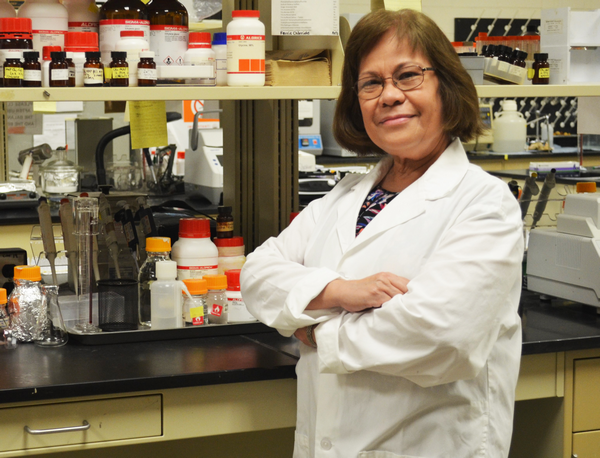A Michigan State University-led research team has received a $769,000 grant from the U.S. Department of Agriculture’s (USDA) National Institute of Food and Agriculture (NIFA) to develop a rapid biosensor test for foodborne pathogens. The project is supported by NIFA’s Agriculture and Food Research Initiative.
The rapid test will be used onsite at poultry farms and processing facilities to inspect large samples for Salmonella and Campylobacter, two common foodborne illness-causing bacteria.
Evangelyn Alocilja, a professor in the MSU Department of Biosystems and Agricultural Engineering, is leading the project. Alocilja, whose work is also supported by MSU AgBioResearch, is a world-renowned expert in rapid biosensing diagnostics for infectious and antimicrobial-resistant diseases, having developed such tests for tuberculosis, dengue, and COVID-19.
 Evangelyn Alocilja, a professor in the MSU Department of Biosystems and Agricultural Engineering.
Evangelyn Alocilja, a professor in the MSU Department of Biosystems and Agricultural Engineering.
According to the USDA Economic Research Service, the U.S. economic burden of Salmonella and Campylobacter from all sources exceeded $6 billion in 2018. Alocilja said previous studies have shown poultry products are one of the most common sources of infection due to bacterial contamination from farm production practices and processing equipment.
Currently, pathogen detection is achieved through traditional bacterial culturing, which is time-intensive and often impractical. Existing rapid tests are expensive and may necessitate trained personnel and a laboratory-style environment, exacerbating the need for an inexpensive and easy-to-use alternative.
“Traditional culturing can take days or weeks, and some modern rapid tests are extremely expensive and require training,” Alocilja said. “The goal is to create rapid tests that are inexpensive and accessible, and easy enough to use that people from many different industries can implement them.”
For this project, the team’s objectives are to optimize Alocilja’s existing biosensor technologies for Salmonella and Campylobacter, develop a cellphone-based application that captures and analyses data from the test, and validate the process at several poultry farms and processing facilities.
Preliminary results showed the biosensor was able to detect genomic DNA of foodborne pathogens in roughly an hour. This method would drastically improve the responsiveness of operations looking to get their products to market as promptly as possible.
“We want to ensure that food is safe while also helping processors get their products into the hands of consumers quickly,” Alocilja said. “If we can troubleshoot problems before the products leave farms and processors, that would go a long way to improving profitability and food safety.”
Source: msu.edu
